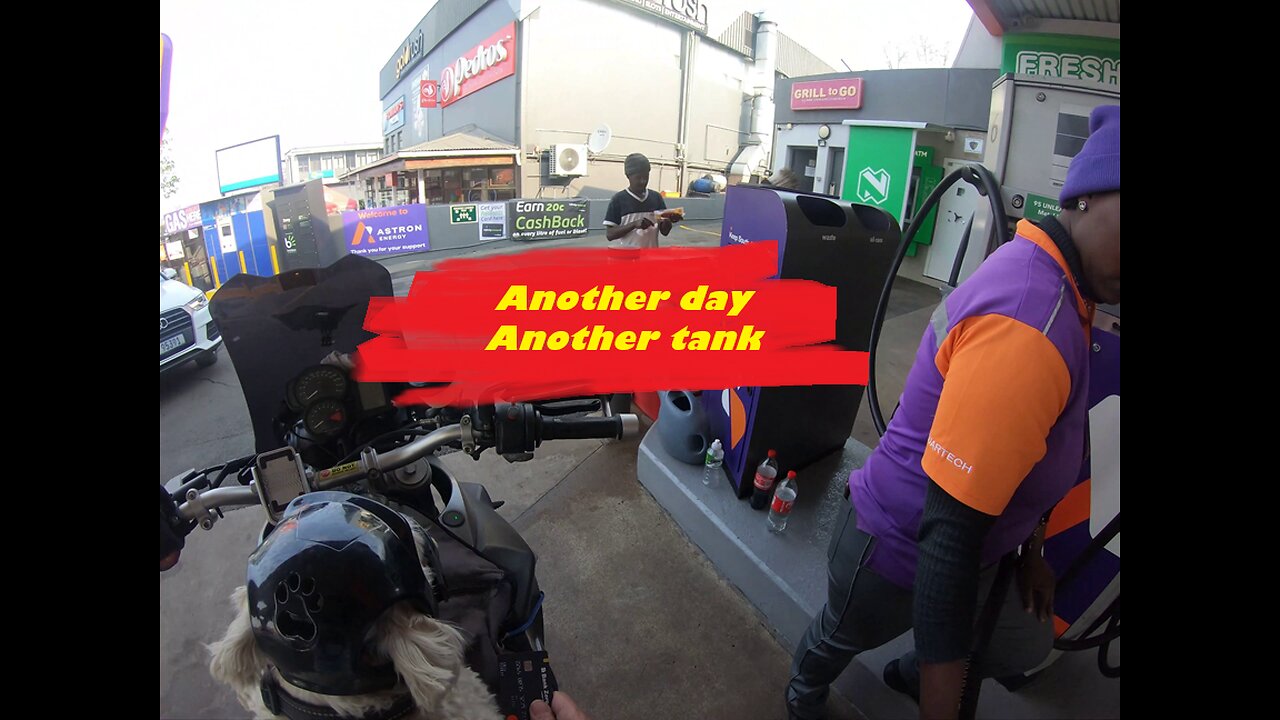Premium Only Content

Another day another tank #africa #jontyk9
Check out Jonty's play list - https://www.youtube.com/playlist?list=PL9ciOxBTp3nR8nixaUhVETRXczQpw8as8
Contact & Socials: https://www.jontyknine.co.za/contact/
061 513 1103
[email protected]
Consider a donation to buy food or clothes
https://www.jontyknine.co.za/support/
Shop:
https://www.jontyknine.co.za/shop/
https://my-store-e3d751.creator-spring.com/
#jontyknine #jonty_k9 #Jontyk9
Fuel prices in South Africa are indeed a hot topic, with many feeling the pinch at the pump. As of July 2025, the price for 95-octane petrol is around R21.46 per litre, while diesel hovers at about R20.65 per litre for 0.05% sulphur and R20.36 for 0.005% sulphur, based on recent data. These prices reflect a mix of global and local factors, and I’ll break down why they’re seen as "ridiculous" by some
Why Fuel Prices Feel Ridiculous
High Taxes and Levies: About 35% of the fuel price comes from taxes and levies, including the General Fuel Levy (GFL) at R4.12 per litre for petrol (post the 16c increase in June 2025) and the Road Accident Fund (RAF) levy at R2.18 per litre. These add a hefty chunk to every litre, making South Africans feel like they’re paying more for government coffers than for actual fuel.aa.co.za
Global Oil Price Volatility: The Basic Fuel Price (BFP), which accounts for roughly 35% of the pump price, is tied to international crude oil prices. Brent Crude dropped from $83.55 to $78.54 per barrel recently, leading to price decreases like the R1.14 per litre drop for petrol in October 2024. But when oil spikes—like during Middle East tensions—prices soar, and consumers feel the hit.cartrack.co.zacartrack.co.za
Rand/Dollar Exchange Rate: The Rand’s value against the US Dollar heavily influences fuel costs since oil is traded globally in dollars. A weaker Rand (e.g., R18/$ as noted in posts) drives up import costs, pushing pump prices higher.
Historical Price Jumps: Since 2000, petrol prices have skyrocketed by 335.98%, with 95-octane petrol rising 368% from around R5 to over R20 per litre. This long-term trend makes current prices seem astronomical compared to the “good old days” when petrol was R9 or less.cartrack.co.za
Regional Disparities: South Africa’s inland prices (e.g., Gauteng at R21.62 for 95-octane) are higher than coastal prices (R20.57) due to transport costs. Compared to neighbours like Namibia (R18.50) or Nigeria (R12 with subsidies), SA’s prices feel steep, especially given local economic pressures.cartrack.co.za
Economic Impact: High fuel prices ripple through the economy, inflating transport and food costs. For businesses, especially fleet operators, fuel is a top expense, forcing cost-cutting or price hikes that hit consumers. Posts on X highlight public frustration, with some blaming government policies like the fuel levy.cartrack.co.za
The Other Side: Why Prices Might Be Justified
Global Context: At R21.46 per litre (USD 1.22), South Africa’s petrol price is close to the global average of USD 1.21 per litre, ranking 66th out of 157 countries. Countries like Norway or Hong Kong pay far more (over USD 2), while oil-rich nations like Nigeria subsidise heavily, distorting comparisons.globalpetrolprices.comcartrack.co.za
Regulation and Stability: The government regulates petrol prices monthly to ensure predictability and protect consumers from wild market swings. The Basic Fuel Price formula accounts for international refining and shipping costs, aiming to keep local refiners competitive.fuelsindustry.org.zagulfstreamenergy.co.za
Recent Decreases: Despite complaints, fuel prices dropped significantly in late 2024—e.g., 92 cents per litre for petrol in September and R1.14 in October—due to lower Brent Crude prices and a stronger Rand. These reductions show the system can work in consumers’ favour when global conditions align.cartrack.co.za
Infrastructure Costs: South Africa’s refineries are ageing or mothballed, increasing reliance on imports. Restarting them could cost billions, so the country pays a premium for imported fuel, adding to the price.caltex.co.za
Critical Take
The frustration over “ridiculous” fuel prices is valid—high taxes and levies, combined with a weak Rand and global oil dependency, make filling up a painful experience, especially for lower-income households. Posts on X reflect this anger, with calls to cut levies or fix refineries. However, the narrative that prices are uniquely outrageous ignores the global context—South Africa isn’t an outlier, and subsidies like Nigeria’s come with trade-offs like fiscal strain. The real issue is the lack of long-term solutions: mothballed refineries, no clear plan to reduce levy reliance, and vulnerability to currency fluctuations. Until local refining capacity improves or taxes are restructured, prices will stay a sore point.
-
 14:45
14:45
Mrgunsngear
23 hours ago $88.39 earnedFletcher Rifle Works Texas Flood 30 Caliber 3D Printed Titanium Suppressor Test & Review
54.2K15 -
 17:17
17:17
Lady Decade
1 day ago $3.52 earnedMortal Kombat Legacy Kollection is Causing Outrage
18.8K6 -
 35:51
35:51
Athlete & Artist Show
1 day ago $7.66 earnedIs Ryan Smith The Best Owner In The NHL?
33.8K4 -
 22:56
22:56
American Thought Leaders
2 days agoCharles Murray: I Thought Religion Was Irrelevant to Me. I Was Wrong.
25.7K6 -
 36:22
36:22
Brad Owen Poker
7 hours agoGIGANTIC $17,000+ Pot In BOBBY’S ROOM! TRAPPING Top Pro w/FULL HOUSE!! Big Win! Poker Vlog Ep 326
30.8K -
 3:53
3:53
NAG Daily
1 day agoRUMBLE RUNDOWN: DREAM HACK SPECIAL W/Greenman Reports
22.1K6 -
 1:28
1:28
Damon Imani
2 days agoThey Laughed at Trump’s Cognitive Test — Damon Made Them REGRET It!
32.4K13 -
 9:14
9:14
Freedom Frontline
1 day agoAdam Schiff PANICS As Eric Schmitt Exposes His Dirty Lies LIVE
21.4K36 -
 10:32
10:32
GBGunsRumble
1 day agoGBGuns Armory Ep 153 Adler Arms AD-9`
14.3K2 -
 35:53
35:53
Degenerate Plays
6 hours ago $0.54 earnedRuckus Randy And Repair Ronald (Socks On) - Call of Duty: Modern Warfare 2 (2009) : Part 7
9.25K1